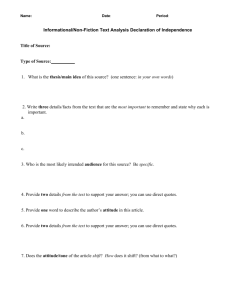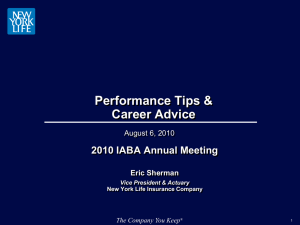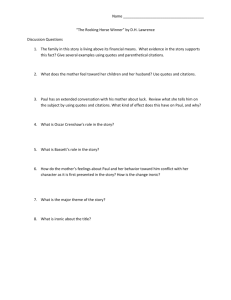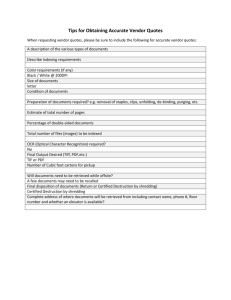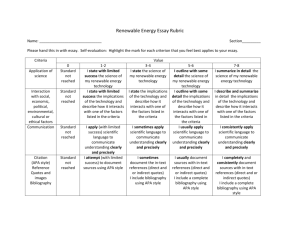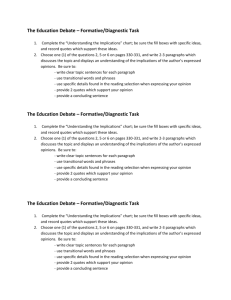Article Critique Forms
advertisement
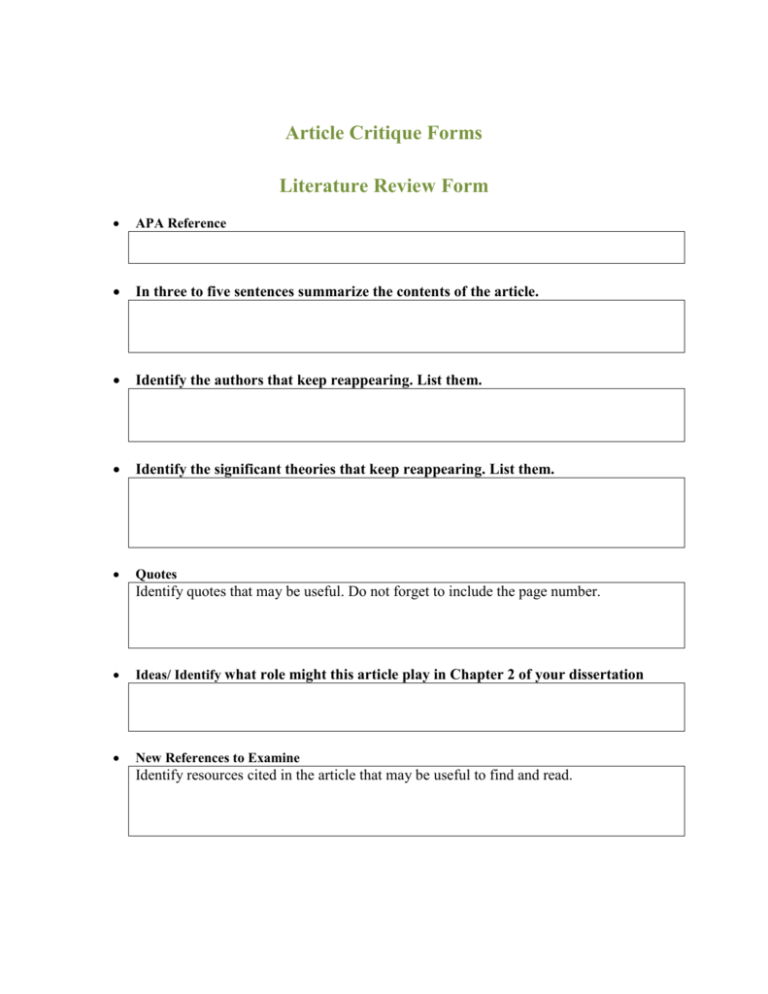
Article Critique Forms Literature Review Form APA Reference In three to five sentences summarize the contents of the article. Identify the authors that keep reappearing. List them. Identify the significant theories that keep reappearing. List them. Quotes Identify quotes that may be useful. Do not forget to include the page number. Ideas/ Identify what role might this article play in Chapter 2 of your dissertation New References to Examine Identify resources cited in the article that may be useful to find and read. Meta-Analysis Review Form APA Reference In three to five sentences summarize the contents of the article. Don’t forget to report the overall effect size (ES). If there are not ESs reported in your article, it is not a meta-analysis! Identify the authors that keep reappearing. List them. Quotes Identify quotes that may be useful. Do not forget to include the page number. Ideas/ Identify what role might this article play in Chapter 2 of your dissertation New References to Examine (Identify resources cited in the article that may be useful to find and read.) Research Review Form APA Reference Example: Rovai, A. P., & Ponton, M. K. (2005). An examination of sense of classroom community and learning among African American and Caucasian graduate students. Journal of Asynchronous Learning Networks, 9(3), 75-90. Type of Research Please specify type of research (e.g., quan., qual. met-analysis) and research design, if applicable (e.g., correlational design, causal comparative design, phenomenology). Independent and Dependent Variables or Variable of Interest (if applicable) Identify the independent and dependent Variable if quantitative; identify the phenomenon/phenomena if qualitative Research Question(s) and Hypothesis(es) State the Research Question(s) and Hypothesis(es). Example: There is no stated hypothesis. Two research questions are proposed: (a) “What is the relationship between the sense of community and student learning ?” and (b) “Do the sense of community and learning differ by culture in an asynchronous learning network (ALN) environment?” It is implied that the researchers believe that culture will influence the students’ sense of community and learning. It is implied that there will be an achievement gap between African American students and Caucasian students participating in online courses. Sample Briefly describe the sample and sampling type. Include the number of participants. Also consider including race and gender. Example: The subjects were 108 educators (96 females, 12 males; 40 African Americans, 64 Caucasians, 4 others) enrolled in an online Doctor of Education program. The convenience sample was taken from four course sections, which had a 96% volunteer rate. Methodology Instruments Indentify the measuring instrument and reliability and validity of the instrument, if discussed. Example: The Classroom Community Scale (CCS; Rovai, 2002) was used to measure social community (connectedness) and learning community (learning and satisfaction). As purported, the CCS has high construct validity. Procedures Briefly identify the procedures. Example: Students participated in two groups, online and residential. The Classroom Community Scale was administered after the completion of the class. Results Results and Conclusions/ Primary Findings State major results and conclusions. Example: For the correlational design, the results suggested a positive correlation between all three community variables and the two learning variables in the ALN environment. Since the findings indicated that there was a weak relationship between perceived learning and course grades, this suggests the learning variables captured two different aspects of student learning. In addition, results revealed large variability of classroom community among the students sampled in the four course sections. This indicated that individual traits of students may impact feelings about social community. For the causal-comparative, the results revealed that the African American group scored significantly lower than the Caucasian group on each of the five dependent variables. This suggests that there is an achievement gap between African Americans and Caucasians in graduate ALN programs. This gap also extended to the sense of community. Analysis Identify analysis procedures and any important results you want to remember. Example: Pearson bivariate correlations for the five variables were all significant at the .05 level. Using canonical correlation, the two subscales of the Classroom Community Scale and the mean number of messages posted each week to the online courses’ group discussion boards were found to be related significantly (p < .001) to perceived learning and total points earned in the course with both pairs of canonical variates included; with the first pair of canonical variates removed, there was no significance (p =.06). The only significant relationship between the two sets of variables existed in the first pair of canonical variates. Limitations Identify the limitations discussed and ones that you identified, especially as they relate to the methodology. Example: Limitations are discussed. The findings of this study have limited generalizability. Gender and race of the professor, as well as the pedagogy used by that professor, may not be representative of other professors and other settings. Cause and effect relationships were not studied nor confirmed. Future Recommended Research Identify what the authors suggest for future studies to resolve ambiguities in the present study or to answer questions raised by the present study. Example: The authors suggest the following for further research: (a) replication of study should be completed in order to determine if findings are consistent across other samples, courses, course designs, and schools; (b) experimental design should be employed ; (c) additional variables should be considered in future studies (online and face-to-face environments should be compared and contrasted, as well as undergraduate versus graduate education); (d) research should be extended to further investigate and elucidate the relationships examined in the present study by changing methodological approach from canonical correlation analysis to structural equation modeling (SEM); (e) further research to determine additional influencing factors on the social community; (f) future research needs to be conducted to identify additional individual factors that influence the sense of community in an ALN course; and (g) future research needs to be conducted with the variable of student learning. Quotes Identify quotes that may be useful. Do not forget to include the page number. Ideas Write down ideas that came to mind when you read the article or identify how this is significant to your study or identify the variable of your study that this is significant to (e.g., this demonstrates the research design I plan to use; explore the instrument used to measure the DV; community ). New References to Examine Identify any resources cited in the article that may be useful to find and read. Theory Review Form APA Reference In five to ten sentences summarize the theory. Remember that this should be a significant theory (e.g., Social Cognitive Theory, Adult Learning Theory), and the article should be written by the primary theorist (e.g., Bandura, Knowles), or the entire article should be focused on explaining or critiquing the theory. Indentify the constructs that keep reappearing. List them and define them. Indentify the primary theorist(s). List them. Identify where this theory originated. Quotes Identify quotes that may be useful. Do not forget to include the page number. Ideas/ Identify what role this article play might play in your dissertation New References to Examine Identify any resources cited in the article that may be useful to find and read.
